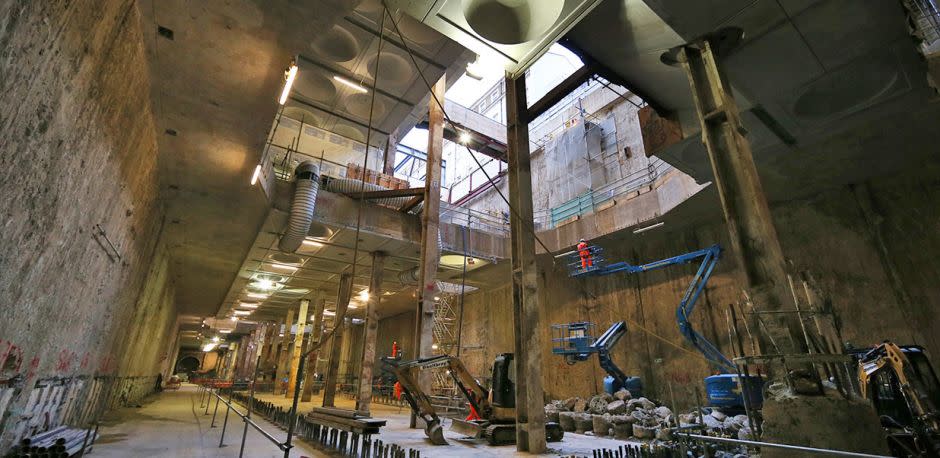InfraRed Capital Partners, the manager of the fund, has over three decades of experience in the industry
The trust aims to provide a sustainable income for investors over the long term and has reconfirmed a dividend of 8.25p per share for 2024 and given guidance that they hope to increase the dividend slightly in future years.
Compared to 2023, the trust’s net asset value (NAV) has fallen by 4.06% and its discount to NAV has widened significantly.
How it fits in a portfolio
The HICL Infrastructure Company trust aims to provide investors with a stable, sustainable income over the long term, along with some capital growth. It invests in infrastructure assets that are vital to communities, covering sectors like transport, utilities and healthcare. Some of the sectors it invests in are in demand no matter what’s happening in the economy, meaning their prices normally increase – often in line with inflation – without affecting demand too much.
The trust could diversify an income-focused investment portfolio, as well as provide some protection against inflation. Investors in investment trusts should be aware the trust can trade at a discount or a premium to its net asset value (NAV).
Manager
InfraRed Capital Partners, or InfraRed, is the investment manager for HICL Infrastructure Company. They are responsible for the day-to-day management of the trust and have been investing in infrastructure since the late 1990s. Edward Hunt, Head of Core Income Funds, leads the InfraRed team and is supported by a team of over 100 infrastructure professionals.
As with any investment trust, there’s also a board that oversees the company management for its shareholders. Hunt is the bridge between the investment team and board, so engagement remains open and collaborative. With seven members the board has a broad range of financial and investment experience which should ensure it’s able to hold the trust managers to account.
Process
The trust is focused largely on the UK, which makes up 64% of its assets, with the rest invested across Europe, North America and Australia/New Zealand. In keeping with HICL’s vision, the managers invest in core infrastructure, which is a part of the market featuring assets that are essential to economies and societies. This includes anything from network assets like water and electricity, to transport assets, including rail networks and motorways. The managers believe that investing in assets playing such a significant role in the well-being of communities can drive sustainable income for investors over time. But it also helps to provide steadier, more reliable returns from their investments. Though there are no guarantees.
The portfolio can be broken down into three main buckets - Public-Private Partnerships (PPP) Projects, Demand-based Assets and Regulated Assets.
PPP Projects are where companies and government work together to build, maintain and fund public services, such as schools, roads or hospitals. PPP Projects made up more than half the trust as at the end of March 2024 and are generally considered lower risk investments. This is because they are backed by the government, though when it comes to investment there’s always risk involved.
An example of a PPP Project owned in the fund is Southmead Hospital in Bristol. This project, which was launched in 2010, is a 35-year agreement to finance, construct, operate and maintain an 800-bed hospital in Bristol on behalf of the North Bristol NHS Trust. The hospital has been fully operational since 2014.
Demand-based Assets provide a useful balance to PPP Projects as they are generally less sensitive to certain political or regulatory risks but are typically more impacted by the state of the economy. The two biggest demand-based assets in the portfolio at the moment are High Speed 1 and the A63 Motorway.
Regulatory assets are infrastructure assets that are deemed essential, such as water or gas utilities. Affinity Water is the largest asset in this part of the trust, making up 8.3% of it at the end of March 2024. This is a water only company and does not get involved in sewage, which means that it hasn’t suffered the same woes as some of the larger water companies.
Regulatory assets are needed regardless of what’s happening in the economy. As a result, their prices can normally be increased – often in line with inflation – without affecting demand too much.
Over the year the trust sold, or announced the sale of, £509m of assets. All of these were sold at or above the valuations which HICL had previously announced for them. A large chunk of the proceeds were used to pay down debt, although the trust also bought three new assets, including a fibre network in France, an offshore windfarm in the UK and a motorway in France.
In addition, the board of the trust announced that they would use up to £50m of this money to buy back shares in the trust, which could be a positive factor for performance.
The trust has the flexibility to use derivatives and gearing both of which can magnify any gains or losses. Investors should be aware that if used, both can increase risk.
Culture
HICL Infrastructure Company launched in 2006 and was the first infrastructure investment company to be listed on the London Stock Exchange. HICL delegate the day-to-day management of the trust to InfraRed Capital Partners. InfraRed has been investing in, and managing, core infrastructure assets for over 20 years. From offices in London, New York, Sydney and Seoul, InfraRed actively manages over 220 infrastructure projects across 17 countries, with over $13bn under management in private and listed funds.
ESG integration
Investing sustainably is central to HICL and InfraRed's culture. The managers ensure each company they invest in takes responsibility for its environmental, social and governance (ESG) impacts, risks and opportunities. They want to see companies with a clear social purpose, with a desire to positively impact the environment now and for future generations, and the drive to benefit the communities where their infrastructure is located.
Infrastructure, as an asset class, is often naturally compatible with sustainable investing. HICL actively contributes to the United Nations Sustainable Development Goals through the delivery of reliable and resilient infrastructure that supports economic development and human wellbeing. They publish an annual sustainability report which can be found on their website.
Cost
The ongoing annual charge over the trust’s financial year to 31 March 2024 was 1.14%, slightly higher than the 1.09% figure for the previous year. Investors should refer to the latest annual reports and accounts, and Key Investor Information Document for details of the risks and charging structure.
If held in a SIPP or ISA the HL platform fee of 0.45% (capped at £200 p.a. for a SIPP and £45 for an ISA) per annum also applies. Our platform fee doesn't apply if held in a Fund and Share Account or a Junior ISA. As investment trusts trade like shares, both a buy and sell instruction will be subject to our share dealing charges within any HL account except online deals in a Junior ISA.
Performance
Since the trust launched in March 2006, it's delivered good returns to investors, though at times there have been periods of volatility.
For example, the trust held up well during the pandemic and delivered strong returns, owing primarily to the defensive nature of the infrastructure assets it invests in. Over the trust’s most recent financial year (to the end of March 2024), performance hasn’t been as strong.
The trust’s NAV fell by 3.70% over this period. While the assets in the trust performed well operationally, their valuations decreased as interest rates rose, making future cash flows less valuable and impacting the overall valuation of the assets today. The trust’s share price fell 13.14% which is behind the average returns from peers in the AIC Infrastructure sector. Past performance is not a guide to the future.
The fall in the trust’s share price means it’s now at a significant discount to the value of the underlying assets in the trust. As at the end of March 2024, the shares of the trust were trading at a discount of 19.01% to the value of the underlying assets. To put this in context, the trust has traded at a premium throughout most of its life, and over the last 10 years has traded at an average premium of 5.36%.
The operational performance of the assets in the portfolio was generally quite strong. The demand-based assets in the portfolio, and in particular HS1, saw a pickup as more people returned to travelling by train.
However, the main driver of performance was the sale of several assets at prices above what HICL had valued them at. The biggest sale over the period was Northwest Parkways, which was sold in two tranches at an average premium of 21% to the valuation that HICL had been using.
These positives were offset by a higher discount rate reducing the valuations of the assets in the trust. The discount rate is the rate used by the managers to value the future cashflows of the trust’s assets. As interest rates have risen, the discount rates used for each asset have also increased. This means that the overall valuation of the trust’s assets have fallen.
The managers declared a full year dividend at 8.25p per share, the same as the previous year. They have also given guidance that they hope to increase it to 8.35p per share for the financial year ended March 2026. This is only an aim, however, and may not be achieved. While the income is lower than some peers, the managers want to keep it sustainable for investors as well as improve the underlying cash flows of the portfolio, which will help improve the trust’s dividend cover. At the time of writing, the trust yields 6.73%, although yields are variable and not a reliable indicator of future returns.
Annual percentage growth
Apr 2019 -Apr 2020 | Apr 2020 -Apr 2021 | Apr 2021 -Apr 2022 | Apr 2022 -Apr 2023 | Apr 2023 -Apr 2024 | |
|---|---|---|---|---|---|
AIC Investment Trust - Infrastructure | -1.12 | 10.54 | 8.77 | -12.37 | -5.18 |
HICL Infrastructure Plc | 4.21 | 8.67 | 8.87 | -8.97 | -15.15 |


